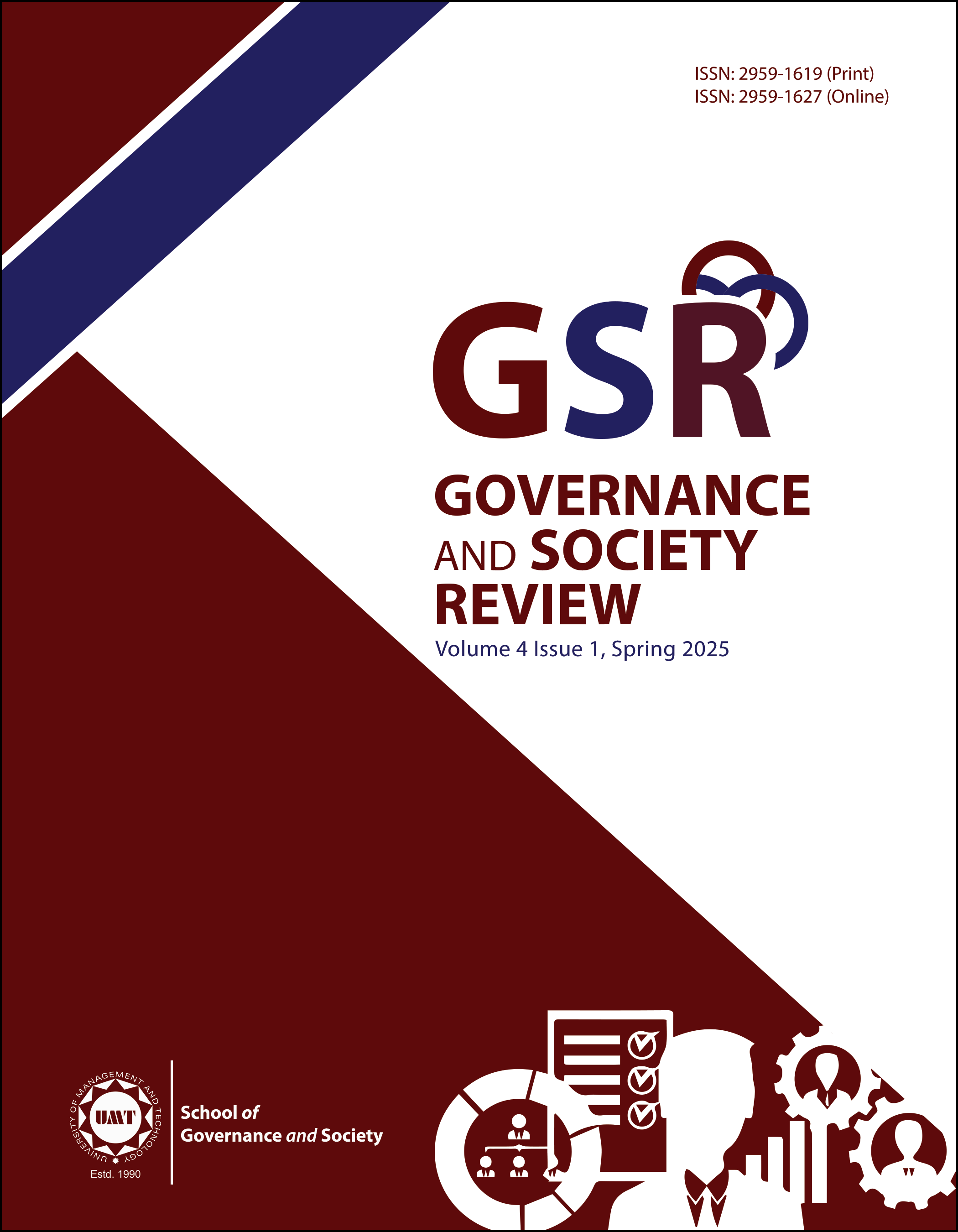A Critical Assessment of Nigeria’s Foreign Policy and National Interest under the Yar’Adua and Jonathan Administrations (2007–2015)
Abstract
 Abstract Views: 0
Abstract Views: 0
This study evaluates the foreign policy approaches of Presidents Umaru Musa Yar’Adua and Goodluck Jonathan between 2007 and 2015, with a focus on their administrations’ advancement of Nigeria’s national interest. It explores the shift from regime-centered diplomacy to citizen- and economy-driven foreign engagement, reflecting broader efforts to rebrand Nigeria’s global image. Yar’Adua’s citizenship diplomacy emphasized the protection of Nigerians abroad, while Jonathan prioritized economic diplomacy aimed at attracting foreign investment and repositioning Nigeria as a key player in global markets. Despite these ambitions, both administrations faced implementation challenges, including weak institutional frameworks, corruption, and internal insecurity. The study applies a critical lens to assess the extent to which these foreign policy strategies translated into tangible gains for Nigeria’s national interest. Recommendations include aligning foreign policy with domestic reforms and strengthening institutional capacity to sustain diplomatic initiatives.
Downloads
References
Adamaagashi, I., Awakessien, C., & Awakessien, S. (2024). Corruption and governance: Examining the impact on political stability in Nigeria. International Journal of Social Sciences and Management Research, 10(2), 1–20.
Adebajo, A. (2010). The curse of Berlin: Africa after the Cold War. Columbia University Press.
Adebajo, A. (2018). Africa and the United States: A history of malign neglect. In D. Nagar & C. Mutasa (Eds.), Africa and the World (pp. 27–50). Palgrave Macmillan. https://doi.org/10.1007/978-3-319-62590-4_2
Adejumobi, S. (2000). Elections in Africa: A fading shadow of democracy? International Political Science Review, 21(1), 59–73. https://doi.org/10.1177/0192512100211004
Agbu, O., & Nzeribe, S. A. (2023). Nigerian foreign policy and challenges of economic development. In U. A. Tar & S. Wapmuk (Eds.), Nigerian foreign policy 60 years after independence (pp. 43–60). Springer International Publishing. https://doi.org/10.1007/978-3-031-06882-9_3.
Akinboye, S. O. (2013). Beautiful abroad but ugly at home: Issues and contradictions in Nigeria’s foreign policy. University of Lagos Inaugural Lecture Series.
Akinola, A. (2024). The declining role of Nigeria as Africa’s peacekeeper in the UN Security Council. African Security, 17(1-2), 59–86. https://doi.org/10.1080/19392206.2024.2359761
Aleyomi, M. B., & Abu Bakar, M. Z. B. (2017). The challenges of citizen diplomacy in Nigeria project, 2007-2010. People: International Journal of Social Sciences, 3(2), 1227–1250. https://dx.doi.org/10.20319/pijss.2017.32.12271250
Ayodeji, G. I. (2016). The role of corruption in festering Boko Haram insurgency and terrorism under Jonathan administration. SSRN. https://doi.org/10.2139/ssrn.2881193
Bach, D. C. (2013). Nigeria's ‘manifest destiny’ in West Africa: Dominance without power. Afrika Spectrum, 42(2), 301–321.
Checkel, J. T. (1998). The constructivist turn in international relations theory. World Politics, 50(2), 324–348. https://doi.org/10.1017/S0043887100008133
Dahl, R. A. (1989). Democracy and its critics. Yale University Press.
Gambari, I. A. (1980). Theory and reality in foreign policy making: Nigeria after the Second Republic. Humanities Press.
Hopf, T. (1998). The promise of constructivism in international relations theory. International Security, 23(1), 171–200. https://doi.org/10.1162/isec.23.1.171
Keohane, R. O., & Nye, J. S. (2001). Power and interdependence (3rd ed.). Longman.
Liu, Z. (2014). The concept of national interests. In J. Yang (Eds.), China's diplomacy: Theory and practice (pp. 121–189). World Scientific.
Mearsheimer, J. (2017). The false promise of international institutions. In J. J. Kriton (Ed.), International organization (pp. 237–282). Routledge.
Morgenthau, H. J. (1949). Politics among nations: The struggle for power and peace. Alfred A. Knopf.
National Bureau of Statistics. (2014). GDP rebasing report. https://www.nigerianstat.gov.ng/elibrary/read/272
Nye, S. Jr. (2004). Soft power: The means to success in world politics. Public Affairs Books.
Ogundiya, I. S. (2010). Democracy and good governance: Nigeria’s dilemma. African Journal of Political Science and International Relations, 4(6), 201–208.
Ogunnoiki, A. O. (2017). An appraisal of Nigeria’s economic diplomacy under President Goodluck Jonathan. International Journal of Research and Innovation in Social Science, 1(10), 16–24.
Ogunnubi, O., & Isike, C. (2015). Foreign policy identity and the politics of economic diplomacy in Nigeria. Journal of African Union Studies, 4(3), 95–111.
Ogunnubi, O., & Okeke-Uzodike, U. (2016). Can Nigeria be Africa’s hegemon? African Security Review, 25(2), 110–128. https://doi.org/10.1080/10246029.2016.1147473
Rosenau, J. N. (1966). Pre-theories and theories of foreign policy. In R. B. Farrell (Ed.), Approaches to comparative and international politics (pp. 27–92). Northwestern University Press.
Saleh, B. (2022). “Nigeria’s foreign policy and economic relations under Yar’adua’s administration: A general appraisal. International Journal of Political Science and Governance, 4(1), 107–123. https://doi.org/10.33545/26646021.2022.v4.i1b.144
Saliu, H. A., & Aremu, F. A. (2013). Nigeria and the UN Security Council: Diplomacy of a candidate state. Nigerian Journal of International Affairs, 39(1), 25–45.
Saliu, H. A., Luqman, S., & Aremu, F. A. (2014). Nigeria’s foreign policy under Yar’Adua: Challenges and prospects. Journal of International and Comparative Politics, 2(3), 1–15.
United Nations Development Programme. (2002). Human development report: Deepening democracy in a fragmented world. Oxford University Press.
Wendt, A. (1992). Anarchy is what states make of it: The social construction of power politics. International Organization, 46(2), 391–425. https://doi.org/10.1017/S0020818300027764
Wendt, A. (1999). Social theory of international politics. Cambridge University Press.
World Bank. (2014). Worldwide governance indicators. https://info.worldbank.org/governance/wgi/
Copyright (c) 2025 Jibrin Ubale Yahaya

This work is licensed under a Creative Commons Attribution 4.0 International License.







